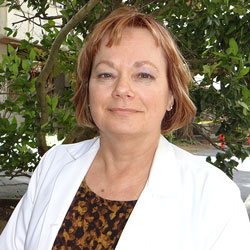
Chronic Orofacial Pain: An update on the use of SSRI, SNRI, and Anticonvulsants
Lori Reisner, Pharm.D.

Current Title:
Clinical Pharmacist, Neurological Surgery
Health Sciences Professor, Clinical Pharmacy
First Year on UCSF Faculty: 1987
Education:
B.S., California State Polytechnic University, 1982
Pharm.D., University of Southern California, 1987
Clinical Residency, University of California, San Francisco, 1988
Fellowship in Pharmacokinetics/Pharmacodynamics, University of California, San Francisco, 1990
Licensure:
Licentiate in Pharmacy, California
Licentiate in Pharmacy, Nevada
Specialty:
Pain Management /Neurosciences
Drug Safety and Managed Care
Professional Biography
Dr. Reisner joined the faculty of UCSF in 1987 as a Pharmacy Practice Resident and has served in various roles since that time, including as a lecturer in Clinical Pharmacy and Dentistry courses and as a clinical pharmacist for the UCSF Pain Management Center. She has also been a research pharmacist for the UCSF Pain Clinical Research Center as well as a consultant to the Center for TMD and Orofacial Pain in the UCSF School of Dentistry. She currently serves on various medication-related committees at UCSF Medical Center and enjoys her role as a preceptor for students and residents. Lori is a member of several professional organizations, including the American College of Clinical Pharmacy (ACCP), the American Pain Society (APS), and the International Society for the Study of Pain (IASP). Dr. Reisner has been involved in the development of a pain traineeship with the American Society of Health-system Pharmacists (ASHP) and has served at different times on the Board of Directors, the Scientific Program Committee and the Task Force for Centers of Excellence in Pain Management for APS. She has also served on the membership committee of ACCP. She received the Long Foundation Award for Excellence in Teaching at UCSF in 1988 and in 2003. Dr. Reisner has been invited to address national and international groups and has publications in peer-reviewed journals such as the New England Journal of Medicine, Neurology, Dental Clinics of North America and the Annals of Pharmacotherapy. She sits on the editorial board for the Journal of Pharmaceutical Care in Pain and Symptom Control, and is a peer reviewer for the Annals of Pharmacotherapy and the Clinical Journal of Pain. She has authored chapters on pain management for the textbooks Clinical Pharmacy and Therapeutics, Handbook of Non-Prescription Drugs and the ACCP Reviews for Board Certification in Pharmacotherapy.
Abstract:
This presentation will focus on nonopoid medications used for chronic orofacial pain, particularly antidepressants (mixed reuptake inhibitors and SSSRIs) and anticonvulsants (antiepileptic drugs/AED). Their respective roles in pain management and effects on sleep will be discussed. In general, the mixed reuptake inhibitors (tricyclic antidepressants/TCA and mixed reuptake inhibitors/SNRI) are prescribed for neuropathic pain syndromes, although some SNRIs are also indicated for chronic musculoskeletal pain conditions. Their advantages include utility in the management of anxiety and depression as well as for pain syndromes. In addition, the sedating TCA have been used to promote sleep. The SSRI class has not been proven beneficial for chronic pain disorders, and may have variable effects on sleep promotion or maintenance. Some anticonvulsants – particularly gabapentin and pregabalin – are widely used for a variety of chronic painful conditions. Other agents may also have benefit for neuropathic pain disorders.
![]() American Academy of Orofacial Pain is an ADA CERP Recognized Provider. ADA CERP is a service of the American Dental Association to assist dental professionals in identifying quality providers of continuing dental education. ADA CERP does not approve or endorse individual courses or instructors, nor does it imply acceptance of credit hours by boards of dentistry. American Academy of Orofacial Pain designates this activity for continuing education credits.
American Academy of Orofacial Pain is an ADA CERP Recognized Provider. ADA CERP is a service of the American Dental Association to assist dental professionals in identifying quality providers of continuing dental education. ADA CERP does not approve or endorse individual courses or instructors, nor does it imply acceptance of credit hours by boards of dentistry. American Academy of Orofacial Pain designates this activity for continuing education credits.


